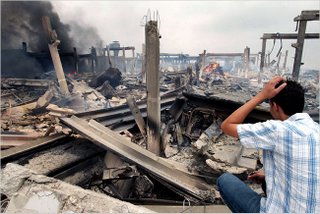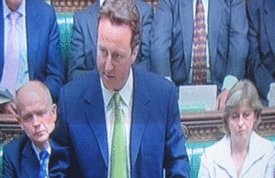 It is hard to decide which part of the British media that is more nauseating: the likes of the BBC, which puts out what is effectively Hezbollah propaganda (the website is, in fact, better) or the ignorant snootiness of the likes of Simon Heffer, known affectionately as the Hefferlump.
It is hard to decide which part of the British media that is more nauseating: the likes of the BBC, which puts out what is effectively Hezbollah propaganda (the website is, in fact, better) or the ignorant snootiness of the likes of Simon Heffer, known affectionately as the Hefferlump.Let us set aside the BBC (as well as the Independent, fond though I am of Robert Fisk’s lunacies). In fact, given the choice examples of British coverage that Stephen Pollard supplies on his blog, it might be a good idea to ignore much of it. It is not a question of them taking an anti-Israeli line and supporting terrorism – they are entitled to that. They are not, however, entitled to equate the two. And they are not really entitled to write and pronounce with quite so much ignorance. On the other hand, several of their European brethren are equally bad and ignorant.
Let us concentrate on the Hefferlump who does not, as it happens, take the side of the terrorists. He is simply not interested enough in what goes on in the big bad world. The piece, entitled “A third world war looms - but Britain has no foreign policy” can best be described as a sort of curate’s egg. It is good in parts. Very few parts. Then again, judging by the largely inane comments posted by his readers, the bad parts have their fan club.
 Let’s get the good bits out of the way first. It is undoubtedly true that Margaret Beckett is an embarrassment as a Foreign Secretary but so was Robin Cook with Jack Straw coming up close behind. And don’t get me on the subject of Douglas Hurd or Malcolm Rifkind.
Let’s get the good bits out of the way first. It is undoubtedly true that Margaret Beckett is an embarrassment as a Foreign Secretary but so was Robin Cook with Jack Straw coming up close behind. And don’t get me on the subject of Douglas Hurd or Malcolm Rifkind.In fact, the only half-way decent post-war Foreign Secretary we have had (actually the ones before the war were not that much better but it was a different world and you could get away with a lot more) was Ernie Bevin, who, as Mr Heffer reminds us, “spent his life as a trade union leader before, at a late age, entering government”.
In a way Beckett does not matter as Blair has been his own Foreign Secretary since soon after 1997 (probably since Cook’s ethical foreign policy collapsed around the government’s ears). Nothing particularly unusual in that. This country has had a number of prime ministers who, either formally or informally, conducted their own foreign policy. Margaret Thatcher did so periodically, others all the time.
 Heffer is also correct in delivering a glancing blow to the Conservative Party, who appear to have no collective views on what is going on in the Middle East. As Tim Montgomerie pointed out on the Toryboy blog, Cameron did not raise the subject during the last PMQ before the summer recess. Judging by some of the comments, large parts of the Conservative Party think there is nothing wrong with that, one little lad (well, I have no idea of his size) even pointing out that this is all happening a long way away and has nothing to do with us.
Heffer is also correct in delivering a glancing blow to the Conservative Party, who appear to have no collective views on what is going on in the Middle East. As Tim Montgomerie pointed out on the Toryboy blog, Cameron did not raise the subject during the last PMQ before the summer recess. Judging by some of the comments, large parts of the Conservative Party think there is nothing wrong with that, one little lad (well, I have no idea of his size) even pointing out that this is all happening a long way away and has nothing to do with us.The Conservative Party has, I believe, has a Shadow Foreign Secretary. He is believed to be the brightest of the bunch around the Boy-King. Have we heard any pronouncements from him on matters international, apart from the benighted EPP?
 Anyway, back to the Hefferlump. I very much fear that he is one of those blessed baa-lambs that I have referred to in a previous posting. He seems not to have read or listened to that exchange between Bush and Blair, unexpectedly caught on the mike, in any detail. Yet it is very short and even Mr Heffer could have found time for that, though he seems to have been put off by that jocular “Yo!” used by the President.
Anyway, back to the Hefferlump. I very much fear that he is one of those blessed baa-lambs that I have referred to in a previous posting. He seems not to have read or listened to that exchange between Bush and Blair, unexpectedly caught on the mike, in any detail. Yet it is very short and even Mr Heffer could have found time for that, though he seems to have been put off by that jocular “Yo!” used by the President.Instead we get the usual stuff about the “master-servant relationship”, Bush’s poodle, yadda-yadda-yadda. Instead of which Blair must take “a more critical line with America” as the latter’s policies have been a disaster and we have been branded by it all, yadda-yadda-yadda.
It seems Mr Heffer has not noticed that, as we pointed out and as Fraser Nelson has written in this week’s Spectator (in case Mr Heffer is too grand to read blogs) Mr Blair does have ideas for a policy and he is always trying to foist it on President Bush. These ideas are all to do with multilateral activity and transnational organizations. They have failed in the Middle East and President Bush has, rightly, rejected them.
 There are already UN peacekeepers in southern Lebanon. They have been there ever since Israeli troops moved out. They have not prevented Hezbollah from arming itself, stockpiling more arms from Iran or from lobbing thousands of rockets into north Israel (described as the northern part of occupied Palestine by the Speaker in the Iranian Parliament).
There are already UN peacekeepers in southern Lebanon. They have been there ever since Israeli troops moved out. They have not prevented Hezbollah from arming itself, stockpiling more arms from Iran or from lobbing thousands of rockets into north Israel (described as the northern part of occupied Palestine by the Speaker in the Iranian Parliament).Another thing about Mr Heffer is that he has really important friends:
“As a former Foreign Office minister put it to me this week, American diplomacy is now a contradiction in terms.”Well, of course, the Foreign Office and its political masters have done so superlatively well in the diplomacy stakes in the last few decades that they are entitled to sneer at the Americans. The history of our negotiations with the rest of the EU would be instructive reading on that score.
Mr Heffer and the former Foreign Office minister might be too grand to listen to my recommendations but I do really think they should read an article in yesterday’s Wall Street Journal Europe, entitled “Lebanon poses risky calculus”. It’s long but not too long and it analyzes President Bush’s and Secretary of State Rice’s reaction to the Lebanese crisis.
Unlike the last time events took this turn and Warren Christopher rushed off to win a cease-fire deal (and much good that did in the region), the present administration takes the view that long-term changes are necessary.
“Instead, when Ms. Rice ventures to the region as early as this week-end, administration officials say that her mission will be to build support for the effective crippling of Hezbollah, which has popular backing across southern Lebanon and has two ministers in the country’s government. The U.S. officials also hope the crisis could end up limiting the influence of Hezbollah’s chief sponsors, Syria and Iran.”The article discusses the various problems that this policy might throw up, not least the possibility of a long-drawn-out battle on the Israeli-Lebanese border that could, quite conceivably, unite that famous Arab street against Israel and the United States, intensifying, if that is possible, anti-Western feelings.
Nevertheless, pace the Hefferlump and his friend the former minister, this is a sensible and imaginative policy, that is already bearing some fruit in the fact that outside Europe and the UN there have been relatively few voices that described Israel’s reaction as “disproportionate”.
Both the Australian and Canadian prime ministers have made it quite clear that they supported Israel’s right to self-defence and the word has gone round that Hamas and Hezbollah are acting as agents of Iran and, to a lesser degree, Syria.
As Michael Rubin wrote, while the original Gaza attack called forth condemnation all over the Middle East, the opening of the second front in Lebanon, had a very different effect:
“No longer subject to Syrian occupation, Lebanese officials spoke freely. The Middle East Media Research Institute translated many reactions. "Lebanon ... is not willing to be the spearhead of the Arab-Israeli conflict," former President Amin Gemayel said. "Hezbollah will have to explain itself to the Lebanese," Druze leader Walid Jumblatt told Le Figaro.In Lebanon itself the reaction has been mixed, as Al-Jazeera reports. Some of the politicians are wringing their hands, trying to explain that it is not fair that their country should be attacked, as they cannot possibly control Hezbollah.
The independent Beirut daily Al-Mustaqbal quoted Lebanese Communications Minister Marwan Hamada saying, "Syrian Vice President Faruq al-Shara gives the commands, Hezbollah carries them out, and Lebanon is the hostage."
Nor did the wider Arab world rally in unanimity toward Hezbollah. "A distinction must be made between legitimate resistance and uncalculated adventures undertaken by elements [without] ... consulting and coordinating with Arab nations," the official Saudi Press Agency opined. Egyptian Foreign Minister Ahmed Abul Gheit included Hezbollah rocket attacks in his condemnation of terrorism.
Even the Arab League, which seldom misses an opportunity to denounce Israel, offered only muted criticism. True, League Secretary General Amr Moussa condemned Israel's "disproportionate attack," after the July 15 meeting, but rather than just slam the Jewish state, Saud al-Faisal, the Saudi foreign minister, chided Hezbollah's "unexpected, inappropriate and irresponsible acts."
Delegates from Bahrain, Egypt, Jordan, Kuwait and the UAE backed Mr. al-Faisal. Ahmed al-Jarallah, editor of Kuwait's Arab Times, condemned both Hezbollah and Hamas in an editorial that same day, writing, "Unfortunately we must admit that in such a war the only way to get rid of 'these irregular phenomena' is what Israel is doing."”
Others, justifiably, bemoan the fact that once again they are getting caught between warring factions with Hezbollah being blamed for its provocative actions.
“There is anger at Hezbollah among many Lebanese who believe that its operation to capture soldiers on Wednesday invited Israel's military response, and some believe that Hezbollah is not acting in the interests of Lebanon.Even when other governments, such as the Iraqi called for Israel to stop “destroying Lebanon’s infrastructure”, there has been a distinct coolness about Hezbollah.
Said Goksel: "If this carries on like this Hezbollah will turn up as the villain in this. This is not going to be healthy for this country. Forget national dialogue. Hezbollah has made it clear that it is not interested in internal politics."
But besides being a militia, Hezbollah is a political party popular with Lebanon's Shia community, and while much of Hezbollah's infrastructure can be destroyed, support for Hezbollah is likely to remain among the Lebanese Shia - the country's largest group.”
Some of this might be due to the despicable and deplorable American diplomacy. Who knows?
There are other issues here. Hezbollah, as Michael Rubin says, makes Arabs nervous because it is seen rightly as Iran’s tool.
“Even as Arab states routinely condemn U.S. foreign policy, they embrace the American umbrella. John Mearsheimer and Steven Walt, respectively of the University of Chicago and Harvard, may argue that "the Israel Lobby" perverts U.S. interests; but Arab leaders understand that the only countries the U.S. military has fought to protect in the Middle East were Kuwait and Saudi Arabia.In other words, he says, the Arab leaders are acknowledging that they can live with Israel and need the United States but Iran frightens them. Their apparently sane attitude proceeds from that rather than any real change of heart about Israel.
The tiny Gulf emirates are defenseless without U.S. protection. There is hardly a state on the Arabian Peninsula that does not train with the U.S. military or welcome a small U.S. presence. But with U.S. congressmen proclaiming the defeat and vulnerability of U.S. troops in Iraq, and the Islamic Republic drawing closer to its nuclear goals, Tehran's stock is rising at U.S. expense.
The signs of Arab unease have been growing over the last 18 months. Jordan's King Abdullah II first raised alarm. In a Dec. 12, 2004 interview with Chris Matthews, he warned that the rise of Iranian-backed Shiite parties in Iraq could give rise to a Shiite "crescent" stretching from Iran to Lebanon. Abdulaziz Hakim, the leader of the Supreme Council for Islamic Revolution in Iraq, called Abdullah's comments "ridiculous," but the remarks resonated in Arab countries.
True, the Shiites might account for only 10% of the world's Muslims, but in the volatile region stretching from the eastern Mediterranean to Iran, the Sunnis and Shiites are near parity. That Shiites predominate in the oil-producing regions not only of Iran and Iraq but also in Saudi Arabia accelerates the fears.
Satellite stations throw fuel on the fire. A July 12 political cartoon in the Iraqi daily al-Mutamar depicted a man pouring gasoline labeled sectarianism into a satellite dish.”
I am not sure this is such a great problem. After all, most alliances in history, as Mr Heffer’s friend the former minister would know, are formed by nations and countries that fear someone else more than each other.
Nor is that the complete story. As the article in this Sunday’s Business, which we have already quoted, points out, the Palestinians are being abandoned.
 This is nothing new and is, in many ways, unfair on the Palestinians, who have been used as proxies by the various Arab states and leaders against Israel. I have never quite understood why the Palestinians accepted their role of everybody’s eternal victim. All those who preached the great crusade were willing to fight to the last Palestinian. When there was trouble, the latter tended to find themselves alone.
This is nothing new and is, in many ways, unfair on the Palestinians, who have been used as proxies by the various Arab states and leaders against Israel. I have never quite understood why the Palestinians accepted their role of everybody’s eternal victim. All those who preached the great crusade were willing to fight to the last Palestinian. When there was trouble, the latter tended to find themselves alone.When the Hamas led PA found itself without donations from the West, the Arab response was very patchy and reluctant.
After all, the highest level of casualties inflicted on the PLO (later transmogrified into the PA) was not by Israel but by King Hussein’s Jordanian army in 1970 –71. Looking at what happened in Lebanon once the PLO decamped there, one might say that the King had been justified to exert all means to protect his country. And it is not over yet, as far as Lebanon is concerned.
It would seem that the Arab states and leaders have decided that it is not just Iran they are going to find hard to live with but also the permanent instability caused by the Palestinians and their various political organizations.
At each crisis, newspapers publish short interviews with assorted Arab shopkeepers, lawyers, students, anyone they can find, who shout their support for whoever is fighting Israel and the United States (usually the Palestinians) and their disgust with Arab leaders who will not support the fight. Each time there are doom-laden predictions about those leaders losing their credibility and, possibly, their lives.
Not only have these predictions not come true, but this time the opposition to Hezbollah and its behaviour is out in the open. Of course, I am careful not to make any predictions and if the fight is prolonged there might be some political realignments.
About the worst thing that can happen, I am sorry to say, would be a premature cease-fire administered by an incompetent UN peacekeeping force that leaves everything in the same position. We can then assume absolutely that the whole cycle will start again with Hezbollah a little better armed each time and with Iran a little nearer to that nuclear bomb.
Meanwhile, what of the EU? Well, some countries have been condemning Israel and calling for multilateral peacekeeping forces. In France, one politician, as the Dissident Frogman relates, has called for France to intervene against Israel. At the risk of possibly annoying Mr Heffer with my language (not that he would condescend to read a blog) I have to admit to thinking: “Yo! Bring it on!” I am afraid it will not happen. The French will not be facing the Israelis any time soon.
The EU, as Dan Bilefsky, something of a cheer-leader for that organization, sadly wrote in yesterday’s Trib, has not acquitted itself well. As ever, faced with a crisis, it had nowhere to go, though Javier Solana was flown by the RAF to Beirut, where he, presumably, went through his usual hand-wringing procedures. He did then go on to Israel and Egypt but nothing much has come out of it all.
 As ever, Mr Bilefsky asked Mark Leonard, the wonder boy of the NuLab Europhile establishment. Mr Leonard was very upset:
As ever, Mr Bilefsky asked Mark Leonard, the wonder boy of the NuLab Europhile establishment. Mr Leonard was very upset:“The EU is based on consensus and has a hard time responding during crises. And it is now floundering because all the previous givens and consensus on the Middle East have become obsolete.”Dear me. Did Mr Leonard not tell us at length that the EU was a spectacularly unusual and successful institution, who was quietly influencing many countries “from Russia to Rwanda” and who was uniquely capable of dealing with the modern world, unlike those outdated nation states.
Now he tells us that it cannot deal with something so predictable as fighting between Israel and Hezbollah on the Lebanese border. What does it tell us about Mr Leonard and the Centre for European Reform that they actually believed the unstable situation of the last few years was a given and a consensus?
It seems likely, though one must not put it any higher, that Hezbollah and its patrons Iran and Syria miscalculated. They were clearly hoping to provoke Israel into a war. They are not very particular about the way they use civilians (especially Maronite Chrisitans) as shields. They were clearly hoping that the mounting casualties, most Hezbollah but some Lebanese, would bring the world in against Israel.
This has not happened. The UN may be huffing and puffing but otherwise, Hamas and Hezbollah are getting support from France, some European and a considerable proportion of British media, the BBC, Robert Fisk, Tariq Ali, George Galloway, the usual crowd of demonstrators in American cities and the moonbat blog The Daily Kos (kind of). There is also half-hearted support from Russia that is unlikely to lead to anything. As for the EU, one can only surmise that Hamas and Hezbollah leaders took it at its own estimation.
COMMENT THREAD
No comments:
Post a Comment
Note: only a member of this blog may post a comment.